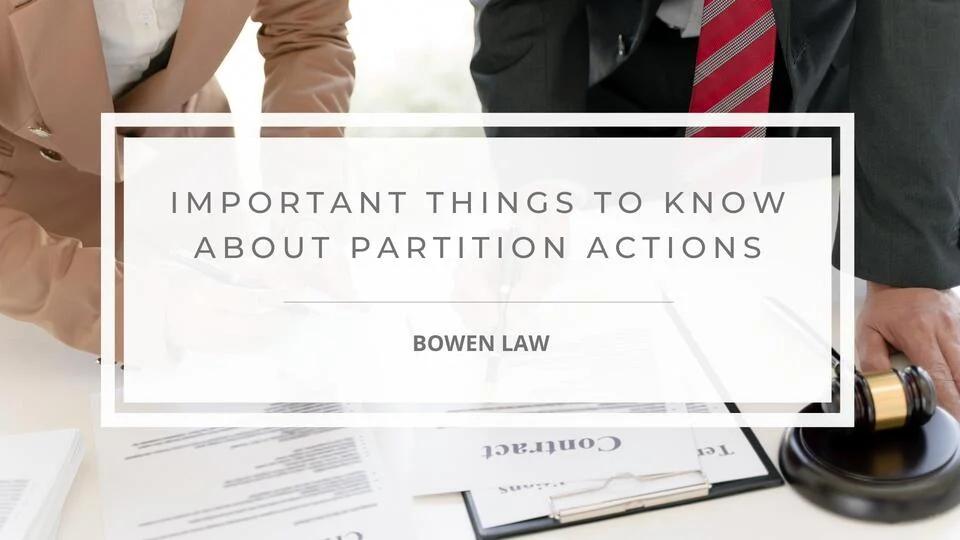One of the most common legal problems worldwide is deciding what to do with a joint-owned property (also known as joint property). Co-owners will likely argue over selling or dividing the property, whether private or business. If discussing matters peacefully no longer appears to be a viable solution, you can always file a partition action.
- What Is a Partition Action?
- Three Types of Real Estate Partitions
- Partition in Kind
- Partition by Sale
- Partition by Appraisal
- Real Estate Ownerships That Can Result in Partition Action
- Joint Tenancy
- Tenancy by Entirety
- Tenancy in Common
- How to Avoid Partition Lawsuit
- Contractual Agreement
- Buyout
- Mediation
What Is a Partition Action?
In Michigan, a partition action is a lawsuit that forces the court to take over the process of dividing or selling a joint property. This action leads to:
A: Dissolving the co-ownership completely, giving each ex-co-owner a piece of the disputed land
B: Selling the property and the proceeds distributed fairly among the co-owners
C: The plaintiff sells his share of the property to his co-owners, removing his rights completely
The only people eligible to file partition lawsuits are inheritors, spouses, and shareholders.
Three Types of Real Estate Partitions
Partition in Kind
A Partition in Kind happens when two or more parties decide to divide a jointly owned property. This type of partition is common in rural areas, with co-owners having a dispute on the usage of land property. In a Partition in Kind lawsuit, the court is given the authority to equitably split the land, with each owner receiving their fair share. Each owner can then decide what to do with their portion of the property without needing approval from others.
Partition by Sale
A Partition by Sale complaint can only be filed when it is impossible to divide the estate physically. For instance, splitting a jointly owned building between co-owners will be difficult. Hence, it will be more reasonable to sell the building and divide the proceeds of the sale. This type of partition typically results in a forced sale, meaning the property sale will go forward despite the protests of other parties involved.
Partition by Appraisal
When there is a dispute over property between co-owners, one owner can offer to buy the interest of the other owner on the said property. When all parties agree, a Partition by Appraisal can be requested from the court. The court will then assess the value of the portion of the property the other owner plans to buy out.
Real Estate Ownerships That Can Result in Partition Action
There are several ways how to own real property. One approach is through joint ownership. Joint ownership is a kind of real estate ownership that involves two or more parties as co-owners of a piece of property. This type of ownership is common among spouses, business partners, and inheritors.
Though joint ownership has its benefits, it is the only form of ownership that can result in a partition lawsuit, mainly if there is a dispute among the co-owners regarding how to use the property.
Joint ownership can be classified into three depending on the circumstances. These are the following:
Joint Tenancy
Joint tenancy happens when more than one party owns a piece of property. In addition, each co-owner has equal ownership rights, which entails that each party has the right to use and enjoy the property they have jointly acquired. Any decisions regarding the property must also be agreed upon by all parties involved.
Usually, joint tenancy comes with a right of survivorship clause. When a co-owner dies, the right of survivorship allows the surviving party to receive the deceased owner’s rights over the property without going through probate.
Tenancy by Entirety
Tenancy by entirety is another form of joint ownership that only applies to married couples. Similar to joint tenancy, tenancy by entirety also comes with a right to survivorship. When one of the spouses dies, the other spouse inherits the ownership of the property. However, joint ownership becomes a tenancy in common when the married couple divorces, allowing each to transfer or sell their portion of the property to another individual.
Tenancy in Common
Unlike joint tenancy or tenancy by entirety, tenancy in common allows co-owners to have unequal ownership over an estate. For instance, one party can own a greater proportion of the property than the other. Each co-owner can also sell or transfer his/her portion of the property whenever he/she decides to, without the consent of other co-owners.
How to Avoid Partition Lawsuit
Partition lawsuits often result from disputes among co-owners of the property. Once a partition action is filed, there is no way to stop it from moving forward. There are certain tactics, though, that you can use to prevent this from happening. Here are some of them:
Contractual Agreement
When two or more persons decide to own a property jointly, they can create a contract that prohibits them from filing a partition lawsuit under specific conditions. For instance, the agreed contract may stipulate that a co-owner can only file a partition action after a certain period since the purchase of the property. The contract may also specify that a buyout or mediation must be conducted in lieu of partition.
Buyout
Before a partition action is filed, you can negotiate a buyout of ownership rights with your co-owner. Typically, this happens when one of the owners decides to sell the property, and the other wants to keep it. As an alternative to partition, both parties can agree that one will buy the property interest of the other.
Mediation
The most efficient and cost-effective strategy to prevent a partition action is to mediate the dispute between co-owners. Mediation is a process managed by a neutral party where each co-owner is given a chance to voice out their grievances. The primary goal of mediation is to reach an amicable agreement between co-owners so that no partition action is necessary.
Michigan Real Estate Lawyers Are Here to Help
If you’re having a challenging time dealing with co-owners, and it seems like there’s no hope for a healthy discussion with them, a Michigan partition action lawsuit is probably your best move. Here at Bowen Law, our Michigan real estate and partition action lawyers can help you resolve any disputed property. Call us at (231) 726-4484 or contact us for expert legal assistance.


